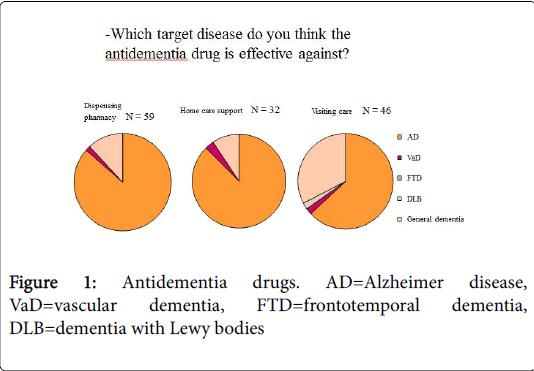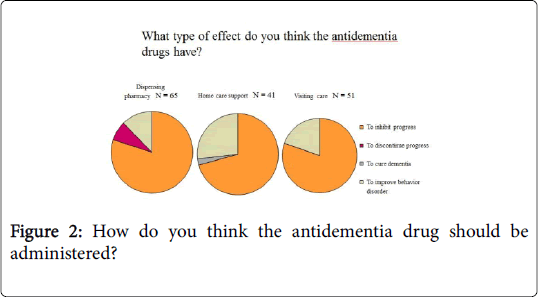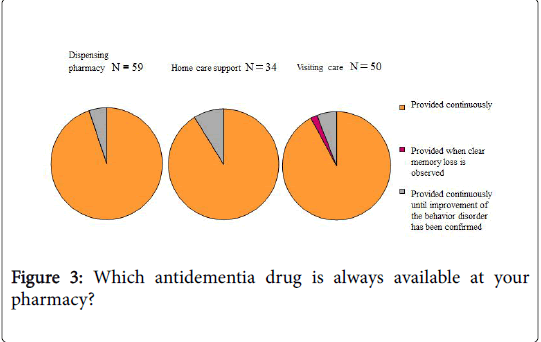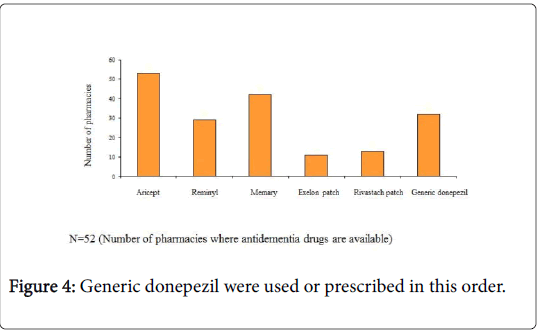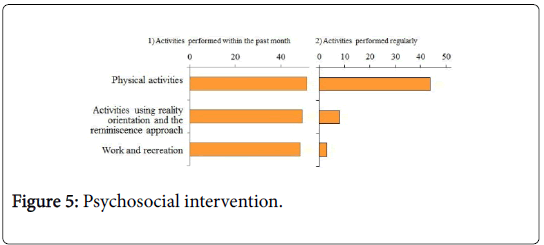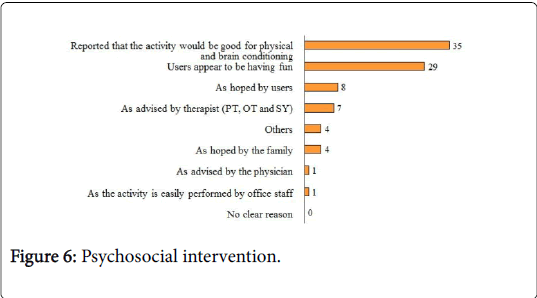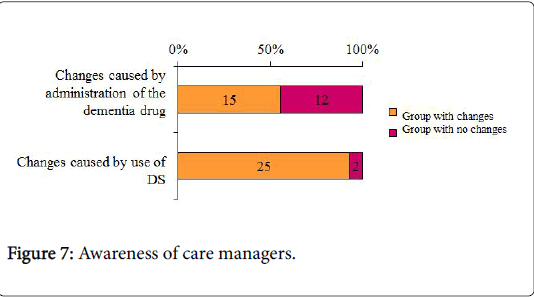Current Healthcare System for Community Residents with Dementia: A Questionnaire Survey for Dispensing Pharmacies, Home Care Support Offices, and Visiting Care Support Offices
Received: 23-Oct-2017 / Accepted Date: 27-Oct-2017 / Published Date: 31-Oct-2017 DOI: 10.4172/2161-0711.1000565
Abstract
Background: Since the number of dementia specialists is limited, dispensing pharmacies provide early detection of dementia patients in the community and drug management instructions, and care managers, who contribute to the collaboration between medical treatment and nursing care, play an important role. This investigation was performed with the aim of clarifying the awareness of dementia medication and actual psychosocial intervention to prepare materials for discussions on a system to provide effective care.
Methods: The subjects were 80 dispensing pharmacies, 114 home care support offices, and 117 visiting care support offices in Osaki City and Kurihara City in Miyagi Prefecture. The questionnaires were distributed on November 8, 2012, and responses were received until November 27, 2012.
Results: For antidementia drugs, the answers from the dispensing pharmacies and home care support offices were generally favorable, but many visiting care support offices answered that the drugs were for “general dementia, not for Alzheimer disease (AD). For psychosocial intervention, all of “physical activities,” “activities using reality orientation and reminiscence approach,” and “work and recreation” were performed during past 1 month, but “physical activities” were most reported as regular activity. Regarding reasons for the intervention, the most often reported response was “Reported that the activity would be good for physical and brain conditions”, followed by “users seem to be having fun.”
Conclusion: Knowledge about antidementia drugs was generally favorable, but further clarification will be required for visiting care support offices. For this, smooth communication will be necessary between physicians and care providers. Among the interventions performed in visiting care support offices, “exercise” was most common. This might be confused with the evidence of exercise intervention for mild cognitive impairment (MCI). Therefore, feedback to magazines etc. used in the visiting care support offices will be essential.
Keywords: Healthcare system; Dementia; Dispensing pharmacies; Home care support offices; Visiting care support offices
Introduction
Treatment of dementia, especially Alzheimer’s disease (AD), includes anti-dementia drugs such as donepezil [1], and nonpharmacological treatment such as reminiscence approach or exercise. According to the Guidelines for Dementia by the Japan Society for Dementia Research (2010), the recommendation level for drug and non-drug therapies is A and C1, respectively, but many reports have suggested that the effects of reality orientation (RO), the reminiscence approach, and cognitive stimulation, could be expected among the psychosocial interventions [2-5]. Psychosocial intervention is important for improvement of the QOL and maximum induction of drug effects. Thus, it is desirable that the intervention should be performed in combination with drug therapy [6,7]. Therefore, collaboration between medical treatment and nursing care is essential for dementia treatment.
Since the number of dementia specialists is limited, dispensing pharmacies provide early detection of dementia patients in the community and drug management instructions, and care managers, who contribute to the collaboration between medical treatment and nursing care play an important role. However, there have been few investigations of how much dispensing pharmacies and nursing care providers actually understand about dementia medication, how to promote collaboration between medical treatment and nursing care, and what kind of psychosocial interventions have been promoted. It is important to investigate dispensing pharmacies, which are directly related to dementia medication, home care support offices, which provide the base for care managers, and visiting care support offices, which provide psychosocial interventions, so that many dementia patients can receive effective treatment.
This investigation was performed with the aim of clarifying the awareness of dementia medication and actual psychosocial intervention to prepare materials for discussions on a system to provide effective care.
Materials And Methods
Subjects and Region
The subjects were 80 dispensing pharmacies, 114 home care support offices, and 117 visiting care support offices in Osaki City [8] and Kurihara City [9] in Miyagi Prefecture.
Investigation method
Questionnaire survey by mail: The questionnaires were distributed on November 8, 2012, and responses were received until November 27, 2012. For the 3 subject categories (dispensing pharmacies, home care support offices, and visiting care support offices), “respondent, office, and knowledge of antidementia drug” were commonly examined, and for home care and visiting care support offices, “user (level of care needed, number of dementia patients, etc.)” and “drug administration (situations of drug management, etc.)” were commonly enquired. For individual categories, original investigation items were prepared.
For dispensing pharmacies, we asked about “explanation/instruction for drug administration upon receipt of the prescription” and “instruction for home care management,” and for home care support offices, we asked about “use of day service (DS) and daily activities,” “collaboration with the primary physician (frequency of hospital visits with a patient, etc.) (e.g.: introducing to a specialist as needed, providing information about the system, service, etc.), and “relationship with the patient or family (level of achievement).”
For visiting care support offices, we enquired about the details of the psychosocial intervention as “nursing care” (e.g.: physical activities, activities using reality orientation and the reminiscence approach, work and recreation) and their reasons in Table 1.
| Dispensing pharmacy | Home care support office | Visiting care support office |
|---|---|---|
| -Respondent (age, sex, job type, job level, years of experience, etc.) -Office (number of users, number of staffs, office hours, etc.) -Antidementia drugs (knowledge, dispensing (pharmacy), etc.) |
||
| -Explanation/instruction for drug administration upon receipt of the prescription (details of instruction upon first/continuous use, etc.) -Instruction for home care management (frequency/details of instruction, etc.) |
-User (level of care needed, number of dementia patients, etc.) -Drug administration (management of drug administration, etc.) |
|
| -Use of day service (DS)/daily activities (number of DS users, details of daily DS activities, etc.) -Collaboration with the primary physician (frequency of hospital visits with a patient, etc.) -Relationship with the patient/family |
Nursing care (Details of activities, etc.) |
|
Table 1: Presents the outline of detailed investigation.
Questionnaires
Antidementia drugs
1) Which target disease is the drug effective against? (for the 3 subject categories)
The question was “Which target disease do you think the antidementia drug is effective against?” and the correct answer was “AD.” (When the survey was performed, dementia with Lewy bodies had not yet been approved, and thus only AD was considered to be the correct answer.)
2) What type of effect does the drug have? (for the 3 subject categories)
The question was “What type of effect do you think the antidementia drugs have?” and the correct answer was “to inhibit progress.”
3) How is the drug administered? (for the 3 subject categories)
The question was “How do you think the antidementia drug should be administered?” and the correct answer was “The drug should be taken continuously.”
4) Are antidementia drugs always available? In such cases, respond with which types of drugs you can provide, in descending order of the number of prescriptions. (only for dispensing pharmacies)
Psychosocial intervention (only for visiting care support offices)
1) Activities performed within the past month or regularly
2) Reasons for the intervention
Awareness of care managers (only for home care support offices)
1) Awareness of changes among users
2) Experience in suspending administration of antidementia drugs, person who decided upon the suspension, and the reasons
3) Level of achievement of “introduction to specialist as needed”
Results
We received answers from 150/311 sites (48%), including 62/117 dispensing pharmacies (53%), 36/80 home care support offices (45%), and 52/114 visiting care support offices (46%).
Antidementia drugs
1) Which target disease is the drug effective against? (for the 3 subject categories). Figure 1 presents the results. The answers from the dispensing pharmacies and home care support offices were generally favorable, but many visiting care support offices answered, “general dementia.”
2) What type of effect does the drug have? (for the 3 subject categories). Figure 2 presents the results. Generally favorable responses were obtained for all 3 categories.
How is the drug administered? (for the 3 subject categories). Figure 3 presents the results. Generally favorable responses were obtained for all 3 categories.
The subjects who provided correct responses to all of the 3 questions mentioned above were considered as “knowledgeable,” which was confirmed in 23/36 home care support care managers (64%), and 31/52 visiting care support office staff (60%).
Are antidementia drugs always available? In such cases, respond with which types of drugs you can provide, in descending order of the number of prescriptions (only for dispensing pharmacies). Among 61 pharmacies, 52 pharmacies (85%) responded that antidementia drugs would always be available. The types of the drugs are shown in Figure 4. Donepezil, memantine, and generic donepezil were used or prescribed in this order.
Psychosocial intervention (only for visiting care support offices)
Activities performed within the past month or regularly. Figure 5 presents the results. All of “physical activities,” “activities using reality orientation and reminiscence approach,” and “work and recreation” were performed during past 1 month, but “physical activities” were most reported as regular activity.
Reasons for the intervention
Figure 6 presents the results. The most often reported response was “Reported that the activity would be good for physical and brain conditions”, followed by “users seem to be having fun.”
Awareness of care managers (only for home care support offices)
Figure 7 presents the results. With respect to changes as a consequence of the dementia drugs, stable feelings, decreased wandering, improved motivation, elimination of delusion, decreased anxiety, etc. were reported. Changes by use of visiting care support offices included increased expressive appearance, normal circadian rhythm, stable feelings, improved motivation, etc. All of the care managers who responded “changed” by dementia drugs also suggested “changed” by use of the visiting care support office. Significantly more “knowledgeable” care managers for dementia drugs responded “no drug effects,” compared with the “non-knowledgeable” care managers (square test, χ2=8.4, α<0.008).
Experience in suspending administration of antidementia drugs, person who decided upon the suspension, and the reasons
Among 34 offices, 16 offices (41%) responded that “We have experience in suspending the administration.” Nine subjects responded that the suspension was determined by “judgement of primary physician” for “side effects” and “worsened dementia,” while 6 subjects responded that the suspension was determined by “judgement of the family” for popular reasons, such as “unclear effects of the drug” and “worsened conditions after administration.”
Level of achievement of “introduction to specialist as needed”
Achievement level in the group with “changed” by antidementia drug was 77.5%, which tended to be greater than the 55.5% in the group with “no change” (t test, t=-1.82, p<0.1).
Discussion
Antidementia drugs
Knowledge about antidementia drugs was generally favorable, but further clarification will be required for visiting care support offices. For this, smooth communication will be necessary between physicians and care providers.
Psychosocial intervention
Among the interventions performed in visiting care support offices, “exercise” was most common. This might be confused with the evidence of exercise intervention for mild cognitive impairment (MCI) [10,11]. Therefore, feedback to magazines etc. used in the visiting care support offices will be essential.
Awareness of care managers
Knowledgeable care managers for antidementia drugs were not aware of changes in users as a consequence of drug administration. Since they knew that the drug might delay the progress of dementia, they might have difficulty being aware of changes in the users.
Conclusion
Table 2 presents the details of psychosocial intervention. In the present situation, exercises are provided without reality orientation/the reminiscence approach, but “reality orientation/reminiscence approach + exercise” may provide a contact point between such circumstances and the activities that were reported to be effective for dementia.
| Physical activities | Work and recreation | |
|---|---|---|
| Reality orientation + no reminiscence approach | Gymnastics, massage Power rehabilitation Mouth exercise Games with exercise Walking |
Learning, crafting Mentally-challenging game Listening to the latest popular songs Singing of the latest popular songs Gardening |
| Reality orientation + reminiscence approach | Reality orientation/reminiscence approach + physical activity = “Festival”! | Confirmation of date, reminiscence approach Birthday party/seasonal event Conversation and activities in which the season can be felt Activities to enjoy long-forgotten music and dramatic performances Singing of long-forgotten songs |
Table 2: Summary of psychosocial interventions.
For example, we would like to propose to arrange a local “festival,” in which the experiences of the elderly would be useful, and this “exercise” could motivate the feeling of seasons and reminiscence and contribute to local development.
Acknowledgement
We are grateful to the staff at Geriatric Behavioral Neurology of Tohoku University CYRIC for valuable comments.
References
- Homma A, Takeda M, Imai Y, Udaka F, Hasegawa K, et al. (2000) Clinical efficacy and safety of donepezil on cognitive and global function in patients with Alzheimer’s disease: A 24-week, multicenter, double-blind, placebo-controlled study in Japan. Dement Geriatr Cogn Disord 11: 299-313.
- Akanuma K, Kasai M, Chiba K, Nakashio D, Sasaki R, et al. (2004) The effects of group work including reality orientation and reminiscence for institutionalized patients with vascular dementia. Jap J Geriatr Psychiatry 17: 317-325.
- Akanuma K, Meguro K, Meguro M, Sasaki E, Chiba K, et al. (2011) Improved social interaction and increased anterior cingulate metabolism after group reminiscence with reality orientation approach for vascular dementia. Psychiatry Res 192: 183-187.
- Baines S, Saxby P, Ehlert K (1987) Reality orientation and reminiscence therapy: A control cross-over study of elderly confused people. Br J Psychiatry 151: 222-231.
- Meguro M, Ishizaki J, Meguro K (2009) Collage technique may provide new perspectives for Alzheimer patients by exploring messages from their inner world. Dement Neuropsychol 3: 299-302
- Meguro M, Kasai M, Akanuma K, Ishii H, Yamaguchi S, et al. (2008) Comprehensive approach of donepezil and psychosocial interventions on cognitive function and quality of life for Alzheimer’s disease: The Osaki-tajiri project. Age Ageing 37: 469-473.
- Meguro K (2017) Cholinesterase inhibitors are compatible with psychosocial intervention for Alzheimer disease patients suggested by neuroimaging findings. Psychiatry Res 259: 29-33.
- Meguro K, Ishii H, Yamaguchi S, Ishizaki J, Shimada M, et al. (2002) Prevalence of dementia and dementing diseases in Japan: The tajiri project. Arch Neurol 59: 1109-1114.
- Meguro K, Tanaka N, Kasai M, Nakamura K, Ishikawa H, et al. (2012) Prevalence of dementia and dementing diseases in the old-old population in Japan: The kurihara project. Implications for long-term care insurance data. Psychogeriatrics 12: 226-234.
- Baker LD, Frank LL, Foster-Schubert K, Green PS, Wilkinson CW, et al. (2010) Effects of aerobic exercise on mild cognitive impairment: A controlled trial. Arch Neurol 67: 71-79
- Lautenschlager NT, Cox KL, Flicker L, Foster JK, van Bockxmeer FM (2008) Effect of physical activity on cognitive function in older adults at risk for Alzheimer disease: A randomized trial. JAMA 300: 1027-1037.
Citation: Akanuma K, Aoki H, Sato Y, Chiba Y, Meguro K (2017) Current Healthcare System for Community Residents with Dementia: A Questionnaire Survey for Dispensing Pharmacies, Home Care Support Offices, and Visiting Care Support Offices. J Community Med Health Educ 7:565. DOI: 10.4172/2161-0711.1000565
Copyright: © 2017 Akanuma K, et al. This is an open-access article distributed under the terms of the Creative Commons Attribution License, which permits unrestricted use, distribution, and reproduction in any medium, provided the original author and source are credited.
Select your language of interest to view the total content in your interested language
Share This Article
Recommended Journals
Open Access Journals
Article Tools
Article Usage
- Total views: 6617
- [From(publication date): 0-2017 - Oct 19, 2025]
- Breakdown by view type
- HTML page views: 5612
- PDF downloads: 1005

